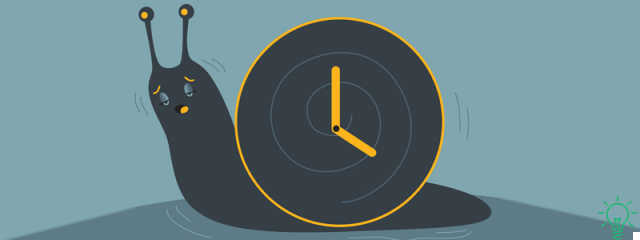
La procrastination, which is our tendency to continuously postpone until later, is the great enemy of anyone who wants to be productive and get results.
For this reason, from a semi-unknown term, it has become the main topic of dozens of personal growth blogs.
With an approach, let's face it, sometimes a bit cheesy.
Everyone gives you recipes in "5 easy steps", lists the "7 negative consequences", reveals the "3 secrets of Fatima" ...
But without really going to the bottom of the problem and, above all, without mentioning a really important aspect: procrastination also has some positives from which you can derive a real mine of advantages.
In fact, in life, to put it in Chinese thinking, for every Yin there is almost always also a Yang.
And even procrastination is no exception to this rule….
The benefits of procrastination
Frank partnoy is a professor at the University of Chicago, author of the book pro-procrastinazione “Wait. The Art and Science of delay”.
Partnoy, in his studies, makes a very daring assumption these days: the anti-procrastination battle has, as a consequence, a global deterioration in the quality of our decisions and actions.
Knowing how to wait and postpone in fact often allows us to do things better.
The concept is not new, on the contrary, it is common to find it in the great classics of political and military strategy (for example in Sun Tzu's “Art of War”).
However, due to the excessive focus on productivity, it has been somewhat forgotten over the years.
According to Partnoy, the advantages of knowing how to procrastinate are at least 6:
1 - Get a more complete picture.
Anticipating decisions often means making them on the basis of incomplete information.
By waiting until the last you can instead consider every any new information.
Think of the goalkeeper who has to save a penalty: if he throws himself too soon, the attacker will inevitably shoot from the opposite side.
If, on the other hand, he manages to wait the last millisecond before the shot, he is able to unmask every feint that is made to him.
2- You have time to make things better.
For example, if you have a week to turn in a job and you use it all up, the final job may be better than if done in just 3 days (Provided you don't fall for the Parkinson's Law trap).
In reality, most chronic procrastinators do not take advantage of this extra time they have, because instead of making the best use of the entire period available, they concentrate all the effort in the last few days.
This is what happens, for example, to those who chronically find themselves doing the nights in the days before an exam.
In the world of work, there is also a special category of people: i pre-crastinator (don't look for it, it doesn't exist in the dictionary).
They are the ones who, out of the anxiety of not finishing in time, start and finish too quickly.
And of course they do things badly.
3- You avoid wasting time on useless things.
By putting it off, it often happens that some things resolve themselves.
Or you just realize that in fact there was no need to do them, as not priority.
Surely it has already happened to you, right?
Systematically throwing yourself into an activity without being sure that it is necessary to do it, causes a long-term waste of enormous energy and time.
Wait a moment and think about it then, perhaps using a priority matrix, can make you better select what is really to be done and what is not.
4- Understand what is really important to you.
Postponing something over and over can simply be a sign that it isn't really that important to you.
In short, the procrastination of a decision or an activity can be the spies on something fundamentally wrong you hear about the activity in question.
So, if you declare a goal but continually postpone the actions necessary to achieve it, perhaps the problem is not that you are lazy, but lies in something deeper and upstream.
For example the lack of motivation.
Or having chosen a goal wrongly.
And it is on this something deeper that you need to focus in order to solve the problem.
5 - Cultivate your creativity
This is perhaps the most important benefit of all.
Numerous scientific studies have shown that procrastination favors "divergent thinking".
In fact, it helps your brain to put itself in "diffuse mode", that is not focused on a single thought or task.
In this way you have the opportunity to space and be more original and creative.
On the other hand, when you are pressed by the need to be productive, your brain tends to rely on pre-established schemes, automatisms, prejudices and preconceptions.
The result will therefore be completely within your comfort zone, i.e. conservative and not very original.
This is good in certain routine situations or situations that require quick fight-flight responses.
But it is very limiting when it comes to imagining creative solutions or evaluating new ideas.
6- You protect yourself from hyper-productivity and its neurosis
But who said we have to be hyper-productive and hyper-efficient all the time?
Our DNA certainly doesn't, the one that was selected during evolution.
Remember that:
every time you find some psychological tendency deeply rooted in the human soul, you have to get the suspicion that, although apparently negative, it must have had a fundamental function in the past for the purpose of survival.
And indeed, if we tend to procrastinate, it is precisely because for hundreds of thousands of years it has been convenient for us to do so!
You see, once we found a hospitable territory to live in, our ancestors of 300 years ago were mainly concerned with save energy for when they would need them.
Hence the tendency to postpone everything that was not strictly connected with their basic needs.
The need for increase your productivity in view of future earnings it began only 10 thousand years ago, with agriculture and livestock.
And with it came stress and neurosis that cavemen didn't even know about (sure, they had other kinds, but no one is prefect, right?).
Manage procrastination
As anticipated at the beginning of the article, our procrastination tendency is an ambivalent phenomenon.
On the one hand, it has deep biological roots and comes with benefits ranging from greater creativity to more effective decision making.
On the other hand, it makes us inadequate to the needs of a society needy and rapid change like the current one.
To understand how to manage this ambivalence, I want to leave you with two fundamental ideas:
1 - “The genius? 80% action, 20% procrastination "
(Paraphrasing Thomas Edison)
Of course, 80% of "action" is very important.
And it is for this reason that, in addition to this on the advantages of procrastination, I also wrote an article of the opposite sign, which is entitled "procrastinate: why we do it and how you can stop".
Reading it right after this, you will have a balanced view of advantages and disadvantages, and you will have learned that, in reality, procrastination is not fought. if the dose.
Like almost everything in life.
Un right mix of procrastination and action in fact:
- makes you more creative
- makes you make more informed decisions
- makes you move through life confidently and quickly
Obviously though, the percentages I put in my paraphrase of Edison's sentence are completely arbitrary.
It is you who must choose the correct ones from time to time.
And this brings us to the second fundamental idea of today's article.
2 - "Everything should be made as simple as possible, no longer simplistic"
(Albert Einstein)
The recipes against procrastination that are proposed to you everywhere, have the merit of trying to correct a way of being that damages you, at least in the current setting of modern life.
However, as we have seen, they completely forget about gods benefits that knowing how to procrastinate brings with it.
I am, in a word, simplistic.
This happens precisely because they are nothing more than recipes.
Do you want to stop procrastinating? Put the flour of habit, the eggs of planning, the sugar of motivation, and run to produce for the world.
But this is not the right way to face one's weaknesses.
Personal growth cannot happen in a simplistic way, just as there is a fundamental difference between learning recipes and learning to cook.
In the first case you stick to a very narrow set of rules, get a decent result, and nothing more.
In the second case instead, you start from the rules but you deepen them, you experiment alternatives, you know their meaning and any exceptions.
The result is that you become autonomous, independent, unique.
For this reason, what you find on the GetPersonalGrowth blog is not simply a collection of recipes, tricks and rules.
Instead, it is a way of analyzing problems and solutions that focuses on because even before the as.
For this reason, when people ask me what I do on this blog, I sometimes reply that I teach how to cook.
And that's why this blog isn't for everyone; some readers are just looking for a quick recipe to put together something decent.
There's nothing wrong with that, that's fine if that's what they need at the moment.
Others, on the other hand, want to "learn to cook". It is especially for them that this blog is. A greeting and see you soon. Anthony







